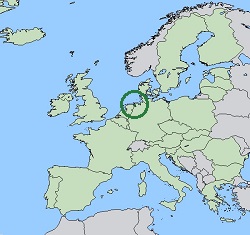Grand Duchy of Grestenbourg
This article has multiple issues. Please help improve it or discuss these issues on the talk page.
|
This article refers to a nation which is currently in a state of inactivity. You can help make the article reflect that or ask on the talk page for further information. |
Grand Duchy of Grestenbourg | |
|---|---|
|
Flag | |
| Motto: Patientia Uincit (Latin: Perseverance wins) | |
| Anthem: Hail to the Duke/Duchess | |
 Northern Coast of Europe | |
| Capital and largest city | Grestenbourg |
| Official languages | German and Dutch |
| Demonym(s) | Grestenbourgan |
| Government | Absolute Monarcy |
• Grand Duchess | Sofia von Grestenbourg |
| Legislature | House of Lords |
| Establishment | 1583 |
| Population | |
• (as of 2010 census) census | 1,324,321 |
| Currency | Grestenbourger Ducat |
The Grand Duchy of Grestenbourg, (German: Großherzogtum Grestenbourg Dutch: Groothertogdom Grestenbourg) was founded in 1583 as part of the Holy Roman Empire. The nation borders the North Sea to its north, Germany to its east and south, and the Netherlands to the west. The nation managed to stay out of both World Wars 1 and 2 maintaining its independence throuhg a series of political maneuvers as well as its status as a Banking and Gambling hub which made it a perfect place for both sides in both wars to spy on one another. In 2012 the nation suffered through a military coup to dislodge Grand Duke Charles from the throne lead by his sister the new and current head of state Grand Duchess Sofia.
Etymology
The Grand Duchy of Grestenbourg's name comes from both its capital city and the family name of its ruling family, "von Grestenbourg".
Government and politics

Grestenbourg is the last remaining of Europe's Absolute Monarchies. Though it has a unicameral legislature. The Nation's House of Lords the body serves as an advisory body to the Grand Duchess who is head of State and Government.
Law and order
While the nation's Supreme Court handles issues between the people and the Monarch most day to day court is handled by local court facilities. The national police is divided into two sections. The National Police and the Gendarmerie. The National Police are the Primary Police force for much of the country including the major cities. The National Police are under the umbrella of the Interior Ministry. The Gendarmerie on the other hand are a branch of the armed forces and under the control of the Ministry of Defense, they handle policing in the small towns and countryside as well as serve as the nation's border guards.
Foreign relations
Grestenbourg maintains good relations with Germany and the Netherlands as well as the Nordic countries particularly Norway. The country is not a member of the EU owing in part to the country's banking sector and its desire to maintain its own currency.
Military

The Grand Duchy operates a military force equivalent in size to about 1.5 NATO Divisions, 13,500 personnel in the Army, 2,800 in the Marine Corps, 5,400 in the Navy, 3,000 in the Airforce and though they are technically part of the armed forces the Guardarmerie who are counted separately have a total standing force of 8,000. Bringing the total closer to 2 Divisions. The standard side arm is the Glock 17 while the Steyr AUG is the primary rifle. The nation operates 2 corvette size ships and about 20 patrol boats. The Airforce boasts a fleet of 20 F-16 Falcon fighters and the Leopard 2 is the main-battle-tank.
Geography and climate
The territory of Grestenbourg is mostly lowlands and hills the climet is mild and temperate like most of Northern Europe.
Economy
The Grand Duchy's Economy is mostly centered on banking, gambling and North Sea oil.
